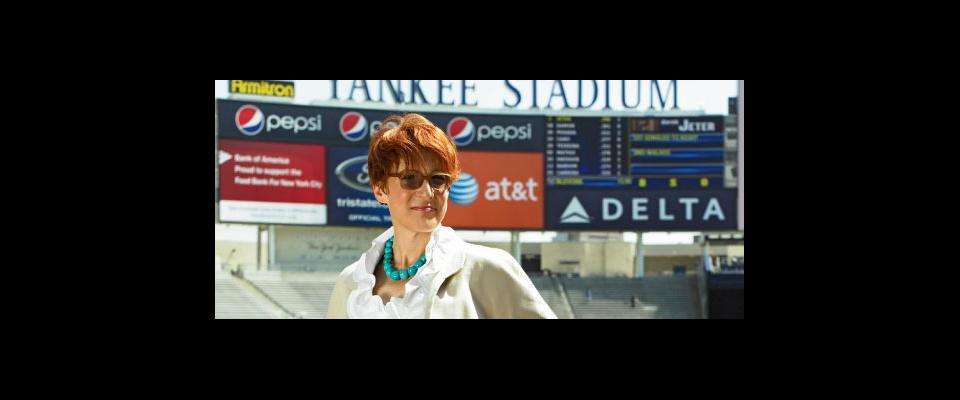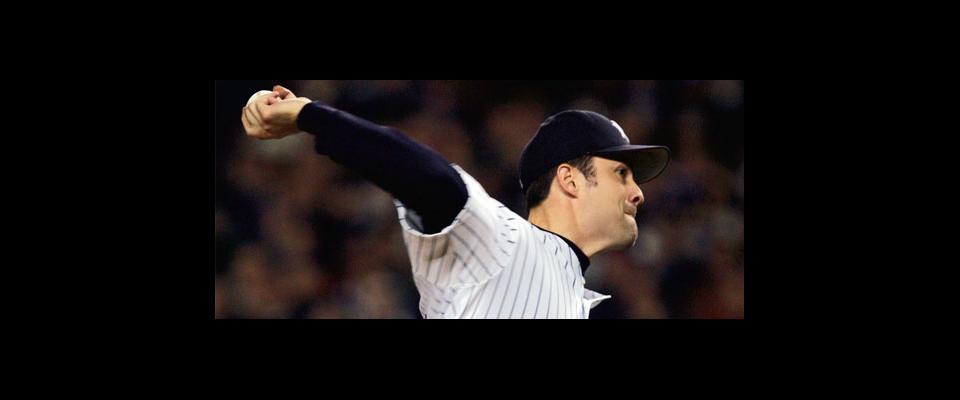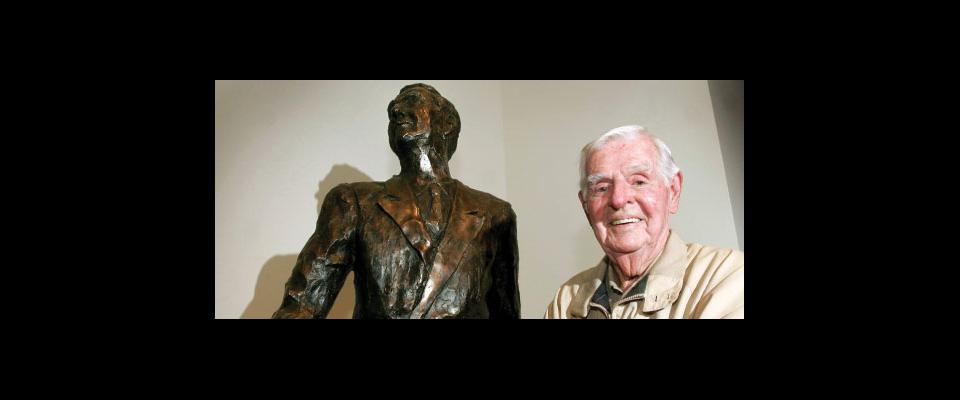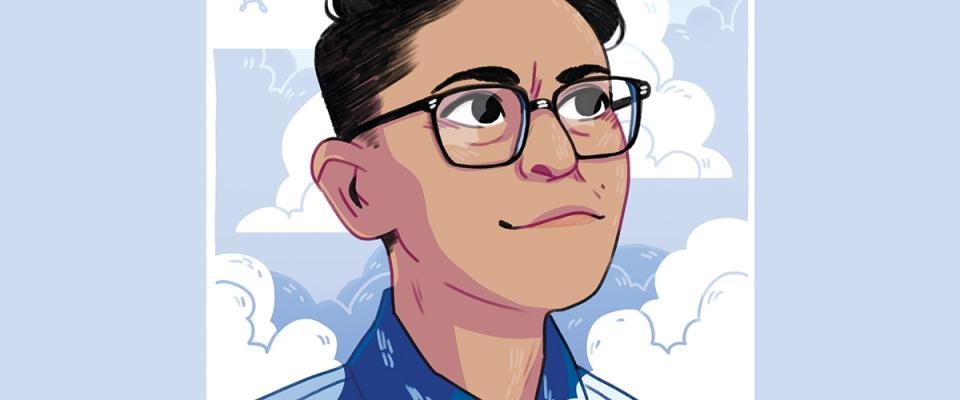A Cal thespian goes to the Big Show.
Jean Afterman ’79 defines herself professionally as an attorney. That she is the vice president and assistant general manager of the New York Yankees comes next. Being one of only three women holding front office executive positions in Major League Baseball is also part of the deal. Nine times out of ten at baseball operations meetings she is the only woman in a room filled with men.
“To say that the gender aspect doesn’t matter is naive,” Afterman says. “But in any situation where you’re the other, you have to find your own way of dealing with that.” She took the direct approach and trained her boss, Yankees general manager Brian Cashman, to introduce her as the assistant general manager. “He even does me the service of saying ‘Be careful, she’s a pit bull attorney!’ But truly, if he does say ‘this is my assistant’—then it’s all about getting coffee and typing letters.”
Afterman is a top negotiator—last winter she handled $423.5 million in free agent player contracts. Negotiating is also what she says she loves most about her job. Before joining the Yankees in 2001, she worked for the “other side,” representing players. “It was fantastic because baseball players were probably the last demographic group to respect lawyers,” she jokes.
With Japanese player-agent Don Nomura, she found a contractual loophole that allowed Japanese pitcher Hideo Nomo to sign with the Los Angeles Dodgers and helped pave the way for the current influx of Japanese players into the U.S. Major League. She has also scouted, signed, and represented Latin American players.
Cashman had sat across from her during contract negotiations and witnessed her in action. “Jean was someone you could talk to and she was funny, but if and when things got complicated, she could roll her sleeves up and be a strong advocate for her client,” he says. When the job with the Yankees came up Cashman thought she was the person to fill it. “I was impressed with her intelligence and ability to react to the circumstances at hand,” he says.
“She doesn’t let much bog her down,” says Kim Ng, who preceded Afterman with the Yankees and is now the assistant general manager for the Los Angeles Dodgers. “She’s got a no-nonsense, no-holds-barred attitude, and if you ask her a question, you won’t walk away wondering where she stands. That’s actually quite refreshing.” But Afterman, she says, isn’t just efficient—she brings a sense of humor to the job as well. “It’s a great mix of irony and sharp sarcasm that keeps everyone on their toes,” Ng says. “Jean’s made many a boring meeting worthwhile.”
With the Yankees, Afterman says the goal is simple: Win the championship. Anything less is a disappointment. “There are high expectations of high performance and we’re under the microscope on everything so there’s no margin for error,” she says.
While she contributes to the process of building and growing the team, one of her specific duties is determining the precise wording in contracts. “It’s about 15 pages of stuff. The Yankees take pride in—we hope—having the most air-tight language that—we hope—covers almost everything,” Afterman says. “Each year we have to add to it, just to keep up!” She feels she’s a stronger negotiator knowing the mindset of both sides. “You throw in everything but the kitchen sink and then they try and take it away from you. You have to allow them to think they get something.”
Afterman has developed her expertise at different stops along the way. When negotiating across the table from the Yankees she learned a great deal from owner and former principal executive George Steinbrenner. And since she started working for the organization, Cashman, who worked his way up from intern in the mailroom to general manager, has been both boss and mentor. “He’s always tried to learn everything he possibly could from everyone he bumped into,” she says. “I try and use that as my guide.” Working with the Yankees puts Afterman in the public arena, and she is always aware of the team’s high profile. The Yankees have played in 39 of the 104 World Series and have won 26 championships, the most of any Major League franchise. Everything connected to them is larger than life.
Baseball beat writers, sports talk radio hosts, specialty bloggers, social columnists, and national tabloids are part of a media swarm keeping track of Yankee goings on. Wins and losses assume epic proportions when viewed through the East Coast sports media lens. A change in the batting order can fuel all kinds of speculation, as can the sight of Cashman chatting with field manager Joe Girardi by the batting cage. “On some days we feel like all we’re doing is sticking our finger in the dike,” Afterman says.
The team’s record-setting third baseman Alex Rodriguez became a national headline staple when he and his wife divorced, followed by speculation that he was dating a celebrity. Rodriguez hit page one this February when he admitted that he had used steroids while playing for the Texas Rangers.
The team has the largest payroll in baseball including the highest-paid third baseman (Rodriguez), the highest-paid shortstop (Jeter), the highest-paid first baseman, and the highest-paid starting pitcher in the history of the game (C.C. Sabathia). All those contracts were negotiated with Afterman’s help.
As mythical as the Yankee team has been, the business is equally outsized. According to an April 16, 2008, Forbes article the Yankees are worth $1.3 billion and are the most valuable team in Major League Baseball. For the fifth straight year they led baseball in attendance with a record 4.3 million tickets sold. To accommodate their fame, in April they opened a state-of-the-art, 51,800-seat, $1.3 billion stadium in the Bronx.
Afterman dubs it “the Acropolis of baseball.” “It is a truly extraordinary structure. You know what they used to say on those That’s Entertainment! shows—’Do it big and do it with class.’ Well, that’s the Yankees. Do it big, do it with class.” Being in the spotlight is nothing new for Afterman. “Theater was my focus and the love of my life,” she says. Though she graduated from Cal with a degree in art history, she studied acting and performed in student productions. She won both the Rosalind Schneider Eisner Prize for Continuing Creative Achievement and the Mark Goodson Prize for Distinguished Theatrical Talent from the Department of Theater where Tony Taccone, now artistic director of the Berkeley Repertory Theatre, was a cast mate.
After graduation, Afterman acted with the Berkeley Shakespeare Festival and the Eureka Theatre Company, but most fondly remembers summer performances with The Old Chestnut Drama Guild at Zellerbach Playhouse. She recalls the costumes that came from a trove of clothes donated by alumni. “There were beautiful beaded dresses from the ’20s and gorgeous couture gowns from the ’30s.”
These days, there’s no time for acting or much else besides the signings, meetings, and watching 200 games a year (she attends all the Yankee home games). In many ways she’s still a Californian and often misses her hometown, San Francisco. She returns to visit her elderly parents whenever she can but often finds her spare time a little too spare. Her father, a sage University of Chicago–trained psychotherapist, once put it into perspective.
“I was ranting and raving about having to go to Tampa for team meetings and not being able to see them and my dad said, ‘These are the things that happen when you serve Rome.'”
Her father’s comments have stayed with her. “I am grateful every day—not only that I have a job, but that I’m working for the Yankees. It’s an organization that doesn’t stand still. Some organizations are mired in their history and tradition and they can’t move forward, and the Yankees certainly move forward. It is a privilege to serve Rome.”





















